For some people, a copywriter or content creator is a dream job. But you’re brimming with ideas on what you should create, not just how. You want to use the analytical as well as the creative side of your brain. And you’re already eyeing up the content strategist’s role that’s giving you the briefs!
You want to know how to become a content strategist. Understandably. There’s a lot of content produced online, but it doesn’t mean it’s any good. When you’re involved in the strategy, you can help shape the content’s direction and impact—and look good as your strategy brings in the leads.
How to become a content strategist from where you’re at right now isn’t always clear-cut. And you may wonder if the grass isn’t as luscious as you thought. That’s why we’ve put together this guide.
In this article you’ll find:
- What does a content strategist do?
- Is there demand for content strategists?
- What’s the average salary for a content strategist?
- What skills do you need to become a content strategist?
- How to become a content strategist (step-by-step)
- Summary
Ready to learn how to become a content strategist? Let’s get started!
1. What does a content strategist do?
In a nutshell, a content strategist plans, manages, executes and optimizes a business’s content strategy to ensure it helps them achieve its goals. These goals usually include building brand awareness, driving leads, nurturing prospects to become customers, and even enhancing customer satisfaction after the sale. Content strategists need to prioritize those goals against their budget and resources.
A content strategist’s role is full of variety. At the planning stage, they need to decide on what content topics, formats and distribution channels will work best, i.e. how to ensure their ideal customers see, click and engage with their content. And what content will compel their prospects through the buyer journey—with their business? (We’ll touch on how they do this later.)
At the execution stage, the content strategist handles content, SEO and voice direction (and often writes the briefs). They decide the content topics and formats, its purpose (i.e. what next steps they want the audience to take) and even SEO and brand voice guidelines. A strategist also manages the content schedule and the approval process.
And once all of that’s done, it’s their job to analyze and report on its effectiveness and identify areas for improvement.
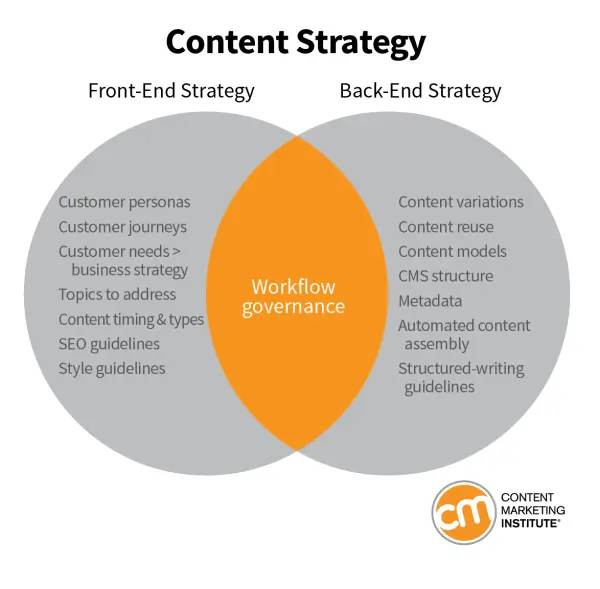
2. Is there demand for content strategists?
Content marketing is nothing new. It’s been around in its current form for around a decade and has been picking up speed. So much so, that the sheer volume of content created online makes it harder to cut through all the noise—which is why there’s such a demand for content strategists.
The Content Marketing Institute’s 2023 report on B2B content marketing found that:
- Only 5% of B2C marketers don’t plan to develop a content marketing strategy
- Only 7% of B2B marketers don’t plan to develop a content marketing strategy
Meanwhile, Hubspot’s 2022 content marketing research found that almost half (49%) of marketing teams allocate 30% to 50% of their budget to content. The good news for would-be content strategists is that, although businesses believe content strategy is important, many are yet to develop one.
Semrush’s 2022 content marketing global study showed that, although 91% of respondents reported using content marketing as part of their content marketing strategy, just 57% of respondents had a documented content marketing strategy in place.
That means that the demand for content strategists should rise, as LinkedIn’s Economic Graph shows:
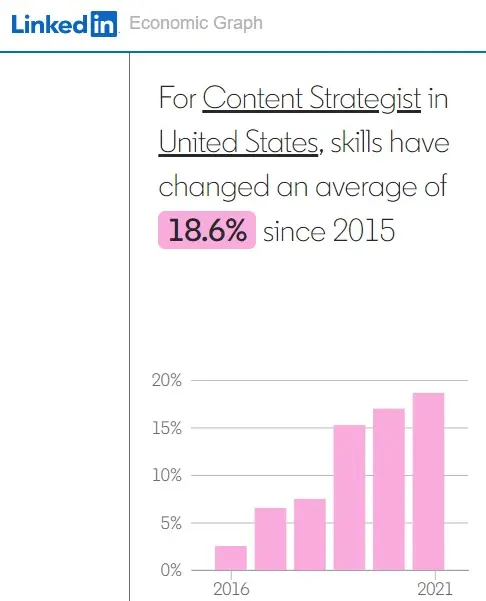
3. What is the average content strategist salary?
As we’ve seen, the demand for content strategists should continue to rise as businesses need to take a more strategic approach to ensure their content hits their objectives. Of course, the question any budding marketer asks is, “What is the average content strategist salary?”.
According to Glassdoor, a content strategist can demand an average of $72,082 per year in the U.S., £48,287 per year in the UK, and €41,345 in Germany.
It typically takes three to five years in content creation roles and another couple of years to demand average salaries. Not forgetting that senior content strategists can demand much more. It’s quite a lucrative career.
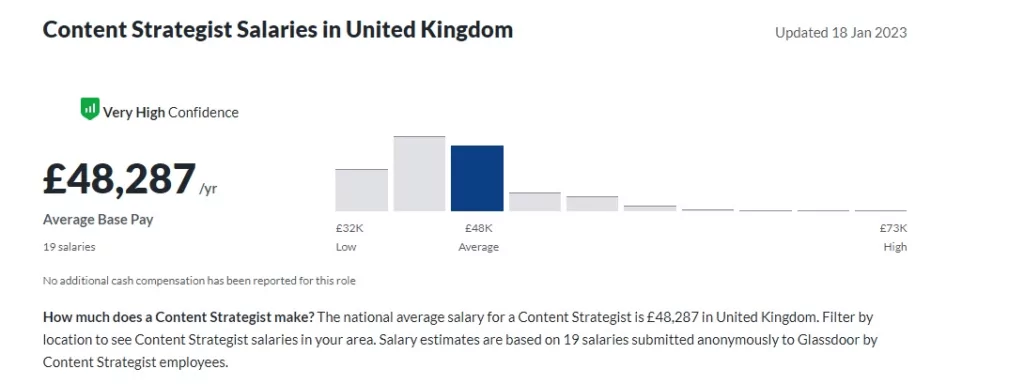
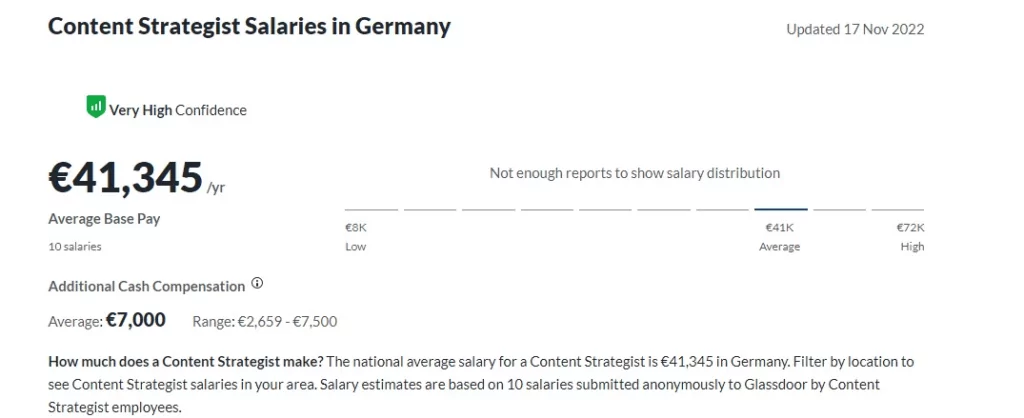
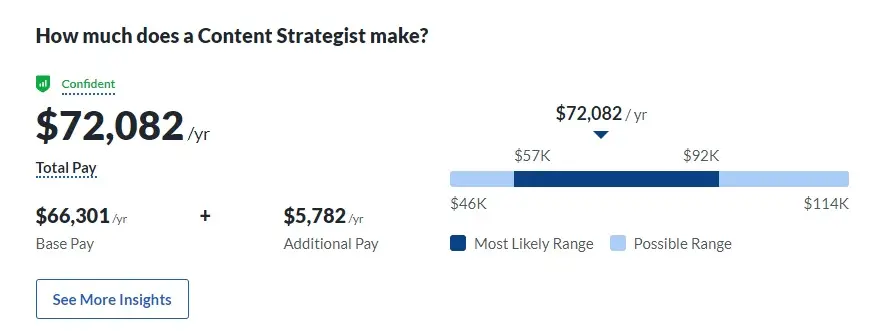
4. What skills do you need to become a content strategist?
So, you’re still reading and interested in this career path. Wondering what skills you need to become a content strategist? As it’s a strategic role, you’ll need quite a few!
A good eye for what makes content compelling
Once you’re at the content strategist level, you’re unlikely to be producing much content. Instead, you’ll be managing a team of content creators. But you’ll need to plan the content, provide content briefs, and consider how the content will move your audience to your desired action. Editing content to ensure it does all this and fits your brand voice is also a large part of the role.
That’s why content strategists have typically spent a few years or more in content creation roles first. After all, how else are you going to know what good content looks like if you’ve not had to hone your craft in creating content?
Buyer persona creation skills
Buyer personas are the heart of any successful content marketing strategy. Only once you understand their pains, challenges and goals and how your business can help solve these can you create compelling content. The kind that attracts, engages and nurtures them towards a sale. Your personas will dictate the topics and format of your content, the search terms you wish to rank for and which platforms work best for distributing content.
You should therefore have solid experience in creating buyer personas using various data points. You’ll need to understand how to analyze your website behavior data, survey and interview customers, conduct social listening and review third-party sources.
Search engine optimization (SEO) knowledge
Content marketing plays a major part in any company’s SEO strategy. It falls on the content strategist to research and identify which keywords their content should rank for in search engines (or just Google!).
A strategist also needs to understand how to tie the content together into hub pages and topic clusters. Doing so not just makes it a better experience for their users—it helps improve search rankings.
A content strategist therefore needs strong SEO skills. They’ll have to identify relevant keywords that stand a chance of ranking in Google, understand search intent (what a person wants to read when they click on a search result) and how to link their content throughout a site to ensure it helps their audience.
Content distribution skills
Where are we going to distribute the content and ensure it gets in front of our target audience? How can we repurpose content to work across different social platforms? Whilst others may execute promoting the content, a strategist needs to answer these questions. You’ll therefore need to be up-to-speed with what platforms your target audience consumes content on and what formats work best on each.
Analytical and reporting skills
In order to report on and optimize your content’s performance, solid analytical skills are a must. You’ll have to identify and look for themes in the best-performing content, identify which traffic sources are bringing the most traffic and leads, and identify any potential issues in your nurturing workflows. And that’s just to name a few areas to analyze!
In larger organizations, you may have end-to-end customer relationship management (CRM) software such as Hubspot or Salesforce which can make this aspect of the job a little easier. An eye for detail and data is still a must—as is the ability to deliver clear results reports.
These skills will put you in high demand as a content strategist, as data analysis is a major skills gap for marketing teams, according to Marketing Week’s survey on marketing careers and salaries.
Great interpersonal and stakeholder management skills
There are many people to deal with and get buy-in from so a content marketing strategy performs well. Subject matter experts, copywriters, social media specialists, sales and the board are just some people you’d deal with. Strong communication, motivation and persuasion skills therefore come as part of the territory in this role.
5. How to become a content strategist (step-by-step)
As is probably quite apparent by now, no business or agency is going to hand you the reins with their content strategy without some background experience and skills. Most expect you to start with content writing or editing roles and work your way up the ladder over three to five years.
Step 1: Land your first content role
There’s tough competition for even junior content roles. How do you land your first role and show you’ve got what it takes to take the next step?
Step 2: Get a relevant qualification
Look at any entry-level content marketing role and you’ll see a common theme: they list a Bachelor’s degree in marketing, journalism or a “related discipline”. Excellent writing and storytelling skills are a must in content marketing, so if you’ve got a related degree, you’ll be off to a good start.
Although jobs may specify a degree, it’s usually a must. Other qualifications can show you have the skills and commitment to the industry.
Start with a free online course
Employers will want to see that you have a solid understanding of where content marketing fits within a wider digital marketing strategy. It’s therefore best to ensure you’re digitally savvy before you dive deep into one area.
Career Foundry offers a five-part Digital Marketing For Beginners Course that gives you a broad overview of digital marketing channels, how to conduct research and marketing metrics you’ll need to track. You even get the chance to put what you learned into practice by developing your first creative.
If you want to delve deeper into content marketing, Hubspot’s Content Marketing Certification provides a solid introduction to becoming an effective content marketer. Although HubSpot’s certifications may help you stand out to employers, the downside is that there’s no opportunity to put what you’ve learned into practice— something employers look for.
Take a hands-on paid course
A great option for people whose degrees or life experience don’t quite “fit the bill” is to look at paid courses. You should look for one that teaches the theory in greater detail, and also provides practical assignments with feedback.
That way, you’ll be starting with a portfolio of work experience to show potential employers.
Not only that, if you get an entry-level job as a content writer/copywriter, a professional qualification can help you take the next rung up the ladder.
The downside: With many marketing courses, there’s no guarantee of work at the end. So you should ask providers what their students’ success rate is with getting paid jobs after graduating.
You may find this helpful: Should You Do a Digital Marketing Degree or a Digital Marketing Bootcamp?
Conversely, one of the unique features of CareerFoundry’s Digital Marketing Program is that they offer 1:1 work with an expert mentor and tutor and the chance to build an impressive portfolio with real-world projects. There’s also the promise their career specialists will help you land a job as a digital marketer within 180 days of graduating from the program—or you’ll get your money back.
Content marketing features as an entire module of the program, ending with a capstone project you can add to your digital marketing portfolio. In addition to that, you’ll also learn about the other crucial parts of the inbound marketing machine: SEO, email marketing, social media marketing, and more. By the end of the course, you’ll have a well-rounded set of projects you can show prospective employers.
Step 3: You’re in an entry-level role in content. Now what?
Now’s the time to prove your worth! As we’ve said, most entry roles into content marketing centre on content creation, and so proving you can do this will often help you up the next stage of the career ladder. But it’s not enough alone.
Here are a few tips to help you propel your career towards becoming a content strategist:
Ask for input into client discovery
Client discovery is the marketing term for asking a client all about their business, what they hope to achieve and what they know about their ideal buyer personas. Even if you’re simply a note-taker, you’ll gain a lot of knowledge about how to conduct these meetings.
Help with buyer persona research and interviews
This can be an eye-opening experience. You get to discover first-hand how buyers communicate their problems, instead of second-hand in the content brief.
Start small
In an agency, you’ll generally start helping with certain aspects of content planning, such as the social media publishing schedule or keyword research. From there, you may start helping generate content plan ideas. If you’re in-house, it may be harder to get hands-on campaign experience. Yet by offering to take the load off your colleagues’ backs, you can quickly build up the skills and find areas to shine in.
Step 4: You’re in your first content strategist role. Now what?
Stay up-to-date on industry trends
As a given, you should read the latest industry reports on benchmarks and new content marketing trends. It therefore helps to subscribe to leading sites and influencers, such as:
- Hubspot
- The Content Marketing Institute
- Copyblogger
- Rand Fishkin
- Neil Patel
- Brian Dean
Build your community of fellow content strategists
As much as the big-name influencers and industry reports can help in your career, you may find that you don’t have the budget or resources to implement their advice.
By connecting with other content strategists at your level or just above on social media, you’ll find “what’s happening right now insights” from those who are going through the same journey as you. (It’s not too difficult, because once you follow or connect with a few, your news feed will suggest other people to follow.)
As content marketing trends change so rapidly, we’re all learning. So why not learn together?
Prove yourself
It sounds obvious, but once you’ve built up a track record of delivering content strategies that deliver business goals, that’s when your upwards career trajectory begins!
6. Summary
So that’s it – everything you need to know about how to become a content strategist. As you can see, a content strategist is a varied role, and a solid foundation in content creation is necessary. Although it’s competitive, it’s an in-demand role. And with hard work, the right mindset and mentorship, it’s a rewarding career that also pays well.
If you’re looking to learn more about the world of content strategy and digital marketing as a whole, why not try out this free, 5-day course? You’ll get a good taste of what the field entails in five short lessons, delivered straight to your inbox.
You may also find yourself interested in one of the following articles:
